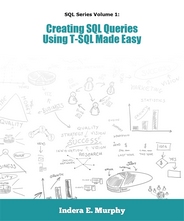|
Creating SQL Queries Using T-SQL Made Easy

|
By Dr. Indera E. Murphy
Published: June 24, 2019
ISBN-13:
978-1-935208-44-0
ISBN-10:
1-935208-44-6
LCCN:
2019907815
308 Pages
Paperback
Price $29.95 US
Table Of Contents
You can buy this book from: Amazon or Barnes & Noble
|
|
Overview
If you have been looking for a book that has a lot of easy to understand step-by-step instructions and screen shots that show you how to create queries using T-SQL, this is the book for you. This book has been designed to have you creating queries quickly, by teaching you the basics and more. It is written from the perspective that you have not created queries using T-SQL. This book is for the beginner. To help you become familiar with the options and features, this book contains over 485 illustrations that provide a visual tour of the results of the queries that you create.
This book will show you how to use some of the most used features of T-SQL, by completing the tasks in each exercise. Topics are explained as you go along. You will cover enough of T-SQL to know whether or not it will handle a large percent of your needs, without investing weeks of your time, trying to learn about a larger number of features and options. This book will get you up and running quickly, by teaching a little more than the basics, so that you can use T-SQL effectively.
Table Of Contents
Chapter 1 - Getting Started With T-SQL
Chapter 2 - Getting Started With SQL Server Management Studio
Chapter 3 - Creating Single Table Queries
Chapter 4 - Filter Data
Chapter 5 - Creating Advanced Single Table Queries
Chapter 6 - Creating Queries That Use Multiple Tables
Chapter 7 - Using Outer Joins To Link Tables
Chapter 8 - Formatting Text And Numeric Data
Chapter 9 - Formatting And Using Date Fields
Chapter 10 - Using Aggregate Functions And Creating Summary Queries
Chapter 11 - Creating Subqueries
Chapter 12 - Creating And Using Views
T-SQL Home Page | Errata |
|





